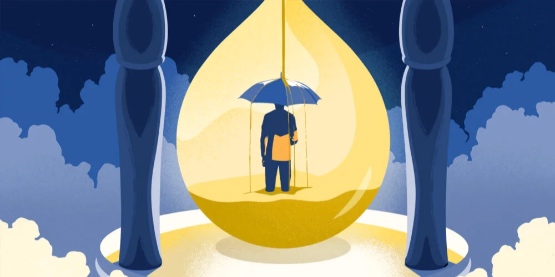Thoughts of death affect individuals; but the dimensions of this thought are very important. Thoughts about death, which are thought intensely pathologically, negatively affect the life and mental health of individuals. For this reason, as with all negative thoughts, thoughts related to the fear of death should also be in a functional dimension. As our attitudes and feelings towards death become excessive, our anxiety may increase and it may be difficult for us to adapt. It is normal for the thought of death to cause anxiety in individuals; but it should not be forgotten that the existence of this thought can lead us to live our lives more meaningfully. Accepting the existence of death can encourage the individual to take the negative affect and move on to reach their values. Fear of death develops when individuals become aware of the end of their life; continues to develop throughout life. When we look at the definitions of death anxiety, we see fear of death and fear of death. Although death anxiety and fear of death are used synonymously, they are separated from each other. Fear of death is tangible and has to do with death being frightening; Death anxiety is related to the fear of extinction.
When we look at the literature, it has been seen that death anxiety is multidimensional;
· Fear of Uncertainty: All kinds of uncertainty cause fear and anxiety in individuals.
Fear of Disappearance and Extinction
Fear of Pain: Due to the fact that chronic diseases are painful, individuals think that death will be painful and they are afraid of it. In addition, the mention of death as a painful event in religious explanations can also cause anxiety about death.
Fear of Loneliness
· Fear of Losing Relatives
Fear of Losing Control: Decreased body control in diseases can create anxiety and fear in the individual.
Fear of Losing a Sense of Identity
· Fear of Regression: The individual who believes that his death is near may experience fear by thinking that he has entered a period of regression.
Fear of Post-Death Punishment
Attitudes Towards Death
The word death has different meanings for each individual. While death is a source of stress for one individual, it can mean a new beginning for another, and relief from stress for others. At this point, what death means to us is very important. If individuals interpret death as the event that ends life, annihilation, they may see death as the enemy that causes the end of life. But when he can see death and life as a whole, he can cope with problems more easily. The important point is to accept that death is a part of life. Just as the definition of death changes according to the personal characteristics, religion and society of individuals, their attitudes towards death also change in this way. Attitudes related to death vary according to the events seen and experienced from the environment.
Individuals' attitudes towards their own death can be explained through 5 main items:
Not Accepting Death: Individuals see death as a situation that should not be accepted, as a disease that should be fought. They act as if the reality of death does not exist, death becomes something to be ashamed of and tried to cover up. Mourning is also seen as a situation that should not be experienced and should be hidden.
The refusal to accept death is divided into two as suppression and masking. Suppression means living as if death did not exist, as if it would last forever. Masking, on the other hand, is not thinking about death and giving oneself to the intensity in order to avoid the negative emotions it will give.
Desire for Death: It is said that the needs of individuals for silence, calmness and comfort stem from the longing for death.
Challenge to Death: Individuals can often have a desire for immortality. Hiding the human body with various ceremonies, preparing and beautifying the dead before burial are some examples of the desire for immortality.
Accepting Death: The basis of being psychologically healthy lies in accepting death. Although individuals act basically as immortal, they know that one day death will come. For this reason, not accepting death can cause negative emotions in individuals.
Grief: There are natural processes that an individual will experience after losing a loved one. A functional grief process consists of 4 phases. First phase; The so-called shock and denial phase lasts for several weeks and is accompanied by intense emotional states. The second phase includes longing for the deceased. The third stage is the adaptation stage. In the fourth stage, the individual reconstructs his identity by establishing new relationships. If the grieving process does not pass through these stages, it may be more difficult to overcome, become more complex and create a pathological problem. According to research, as age increases, the probability of experiencing fear of death increases in direct proportion. As we mentioned in the steps above, accepting the existence of death greatly reduces the possibility of rejecting death and going through an unhealthy process.Creating meaning in our lives, finding a reason to live makes it easier to face death and accept it.

